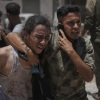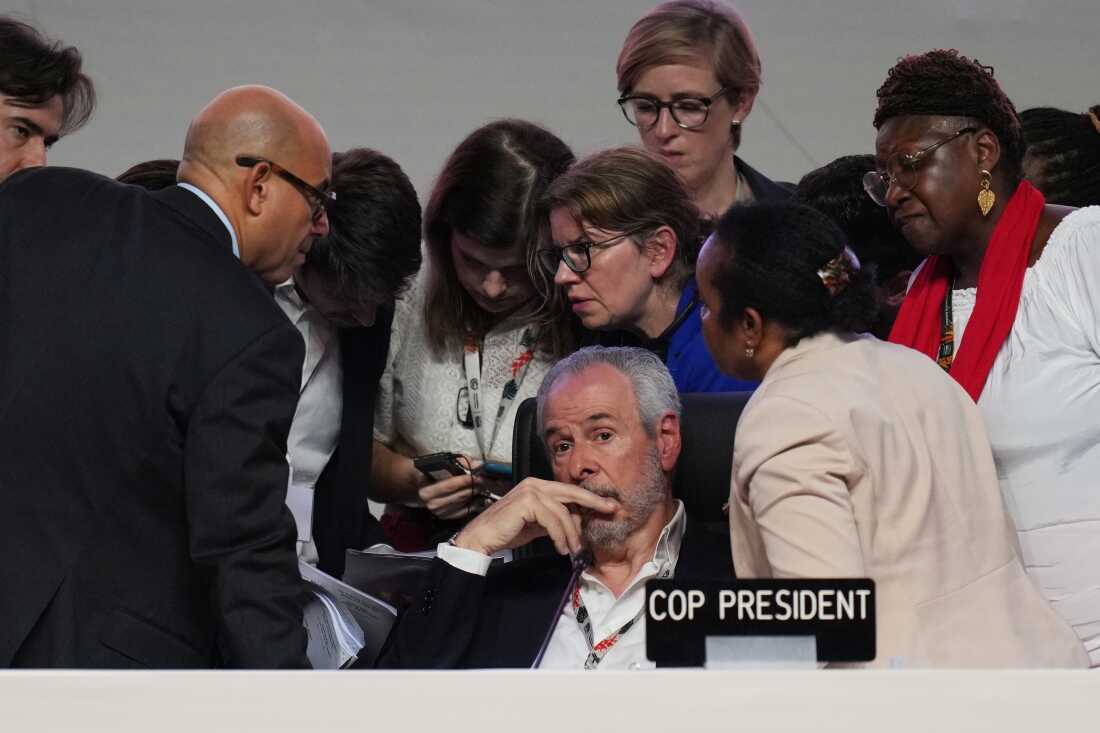AFP journalist Khader Zaanoun poses for an image in Gaza Metropolis on Tuesday. AFP journalists within the Gaza Strip say power meals shortages are affecting their means to cowl Israel’s battle with Hamas militants.
AFP/Getty Photographs
cover caption
toggle caption
AFP/Getty Photographs
French information company Agence France-Presse is asking on the Israeli authorities to permit its freelance journalists to depart the Gaza Strip due to a worsening starvation disaster there.
“They’re spending so much time and energy trying to source food and also just they just feel so weak,” Phil Chetwynd, AFP’s international information director, informed NPR’s Morning Version on Tuesday in regards to the state of affairs for reporters and photographers the company works with in Gaza. “They talk about constant headaches, constant dizziness. So just the ability physically to, you know, get to a story is diminished.”
Chetwynd was talking a day after the journalists’ union at AFP issued a dramatic plea for assist on Monday.
“Since AFP was founded in 1944,” the company’s Society of Journalists stated on X, “we have lost journalists in conflicts, some have been injured, others taken prisoner. But none of us can ever remember seeing colleagues die of hunger.”
The union described the state of affairs of regionally based mostly AFP freelancers working in Gaza. Israel has not permitted unbiased entry for worldwide journalists to enter the enclave since Hamas’ Oct. 7, 2023, assault on Israel. The union quoted a Fb submit by a photographer: “I no longer have the strength to work for the media. My body is thin and I can’t work anymore.”

AFP journalist Bashar Taleb poses for an image within the Gaza Strip on Tuesday. The company’s Palestinian textual content, picture and video journalists say that shortages of meals and water are making them sick and exhausted.
AFP/Getty Photographs
cover caption
toggle caption
AFP/Getty Photographs
The shortage of entry to meals for the estimated 2 million Palestinians in Gaza has alarmed international leaders. Extreme meals shortages and widespread starvation proceed, and Gaza well being authorities say 25 kids have died from “famine and malnutrition” prior to now week.
On Tuesday, U.N. Secretary-Basic António Guterres warned that “malnourishment is soaring. Starvation is knocking on every door.”
He informed the Safety Council that Gaza was a “horror show with a level of death and destruction without parallel in recent times.”
Reporting in Gaza has been lethal all through the greater than 21 months of battle, with at the least 186 journalists killed within the embattled enclave, the nice majority Palestinian, and most frequently due to Israeli airstrikes, based on analysis by the Committee to Defend Journalists, or CPJ.

Palestinian journalists, kids and households collect to demand an finish to Israeli assaults and the entry of humanitarian help, on July 19, in Gaza Metropolis. Highlighting the rising meals scarcity, demonstrators held banners studying “Gaza is starving,” “Stop the attacks,” and “We appeal to the world’s conscience.”
Saeed M. M. T. Jaras/Anadolu by way of Getty Photographs
cover caption
toggle caption
Saeed M. M. T. Jaras/Anadolu by way of Getty Photographs
However starvation has turn into a deepening problem, as NPR’s Gaza-based producer Anas Baba defined in a narrative earlier this month, describing his expertise looking for meals from a website supported by the U.S. and Israel referred to as the Gaza Humanitarian Basis. He confronted Israeli navy hearth, threats from personal U.S. contractors, crowds preventing for rations and masked thieves.
The Committee to Defend Journalists stated this not solely threatens the lives of the media staff in Gaza — it additionally leaves a widening influence on the knowledge the world can receive from the territory.
“As these journalists face starvation, displacement, and constant threat of attack, the international community risks losing its last independent source of reporting from inside Gaza,” CPJ Regional Director Sara Qudah stated in an e mail to NPR. “That’s not just a loss of information—it’s a collapse in transparency, a blow to advocacy for civilians, and a dangerous opening for impunity. Silencing journalists under these conditions is not simply a media freedom issue—it’s a crisis of global accountability.”
United Nations spokesperson Stéphane Dujarric informed reporters on Tuesday: “I read the [AFP union] statement and it is heartbreaking. … It is a reminder of the work that those journalists who have stayed in Gaza, those Palestinians who have stayed in Gaza, are putting their lives on the line to report, in the face of fighting and in the face of hunger.”
Israel’s authorities didn’t reply to a request for remark in regards to the AFP’s request to permit its journalists to depart Gaza.
The push from AFP acquired help from French International Minister Jean-Noël Barrot on Tuesday, who stated he hoped the journalists could possibly be evacuated “in the coming weeks.” Barrot additionally referred to as on the Israeli authorities to permit the worldwide press again into Gaza.
Israeli authorities have beforehand introduced teams of worldwide journalists on military-led visits to Gaza and have stated that they need to not go to the territory unaccompanied for safety causes.
“I ask that the free and independent press be allowed to access Gaza to show what is happening there and to bear witness,” he informed France Inter radio station.







